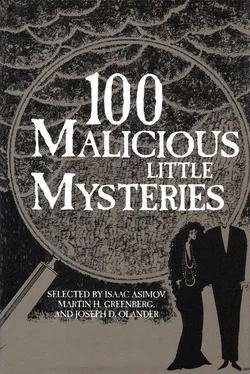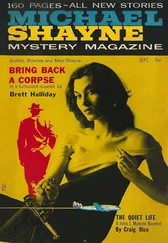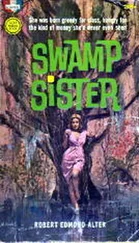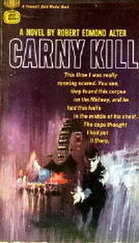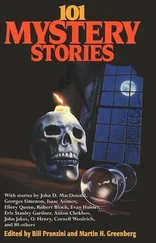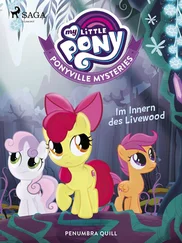Smith stared at me and then he took a breath. “All that won’t be necessary. I will leave now and you will never see me again.”
I shook my head. “I prefer my plan. It provides protection for my future.”
He was thoughtful. “Why don’t you go direct to the police?”
“I have my reasons.”
His eyes went down to his gun and then slowly he put it in his pocket. An idea came to him. “Your wife could very easily hire someone else to kill you.”
“Yes. She could do that.”
“I would be accused of your death. I could go to the electric chair.”
“I imagine so. Unless...”
Smith waited.
“Unless, of course, she were unable to hire anyone.”
“But there are probably a half a dozen other...” He stopped.
I smiled. “Did my wife tell you where she is now?”
“Just that she’d be at a place called the Petersons. She will leave at eleven.”
“Eleven? A good time. It will be very dark tonight. Do you know the Petersons’ address?”
He stared at me. “No.”
“In Bridgehampton,” I said, and I gave him the house number.
Our eyes held for half a minute.
“It’s something you must do,” I said softly. “For your own protection.”
He buttoned his coat slowly. “And where will you be at eleven, Mr. Williams?”
“At my club, probably playing cards with five or six friends. They will no doubt commiserate with me when I receive word that my wife has been... shot?”
“It all depends on the circumstances and the opportunity.” He smiled thinly. “Did you ever love her?”
I picked up a jade figurine and examined it. “I was extremely fond of this piece when I first bought it. Now it bores me. I will replace it with another.”
When he was gone there was just enough time to take the glass to a detective agency before I went on to the club.
Not the glass in the safe, of course. It held nothing but my own fingerprints.
I took the one that Mr. Smith left on the cocktail table when he departed.
The prints of Mr. Smith’s fingers developed quite clearly.
Out of Order
by Carl Henry Rathjen
The kid got it in the back at seven-thirty that evening.
He’d answered the service station’s inside phone, listened, then covered the mouthpiece and said to Jim Daly, “Duck! It’s The Sniper. I’m going to call his bluff.”
“Don’t,” Jim had warned, feeling exposed with glass on four sides of the office.
But the kid ran out to call the police from the phone booth near the driveway. A customer, driving in, made him swerve, slipping on a glob of grease. So there was no telling whether the slug got him before or after he began twisting down. No telling from which direction it came. And no sound of a shot either.
Jim Daly, with hair as black as the grease on big knuckles he kept rubbing into a palm, told all that to Whitehead, the squat, blond detective who came in the second police car while the ambulance guys were covering the kid with a canvas.
“So that’s an out for you, I suppose,” Daly added.
This was the seventh such robbery of a service station. Somebody phoned and said, “You’re covered with a gun, every move. Put a clip or rubber band on the bills from the till. Drop them over the wall behind the air hose, then go on with your work. Don’t get nosey or call the police. You’ll be covered every moment.” Seven of them, and the police, as usual, said they were working on it. Now the kid was dead. The first killing.
Whitehead’s square face got a little white, then he spoke quietly. “Seeing anybody killed is hard to take, but was he something special to you?”
Jim Daly looked toward the canvas, a hub for a ring of morbid stares being held out of the station by uniformed police.
“He tried to hold me up once,” said Daly. “I talked him out of it and gave him a job.”
Whitehead stared. “Instead of calling us.”
“All he needed was a break,” snapped Daly.
“That’s all we need too,” Whitehead murmured. His partner, a thin man with razor-sharp gaze, said nothing.
“In other words,” Daly charged, “you haven’t done a damn thing. Now a good kid’s dead, murdered. He never had a chance.”
Whitehead seemed to sort words before he spoke. “You’d know better than I would how many service stations there are in the metropolitan area. Close to a couple thousand, isn’t it?”
“All right,” said Daly. “You can’t stake out every one of them. But you guys are supposed to know how to run down these killers.”
“It takes time,” Whitehead began.
“I can’t get away with that in my business,” Daly declared. “I’m expected to trouble-shoot a customer’s car in five minutes.”
Whitehead nodded, staring around at apartments across the avenue, store windows facing the sidestreet with a slice of night sky showing in the alley.
“And the customer,” he said with a slight smile, “expects it because he thinks it’s easy, doesn’t know the problems of your job. That works two ways, Daly. If you were a policeman, you’d know.”
“I tried to know once.” Daly pressed his lips.
Whitehead faced him curiously.
“Why’d they turn you down?”
Daly answered defiantly, staring at a fist making his thumbnail white as the blood squeezed back. “I did time once when I was a kid.”
Whitehead studied him. “That’s why you gave this one a break.”
Daly nodded. “That’s why I’m sore, damn sore. A guy sees he’s made a mistake and more than makes up for it. Then someone louses it up for him, and you hand me the usual hogwash alibi. Save it for somebody else. I’ll find who got him.”
“Take it easy,” Whitehead began.
“That’s the trouble. I have, waiting for you to do something.”
Daly pulled off his coveralls.
But he was still in the station at midnight, though not open for business, when Whitehead drove in with his partner.
“Got it solved, Daly?” he asked, neither sarcastic nor hopeful as he leaned against the desk, hands in the pockets of his topcoat.
Daly poked a thick finger in a cigarette pack that looked as though it had been sat on. “It’s like tracking down a miss in a car. I’ve found out where it can’t be from.”
“I know what you mean,” said Whitehead. He waited. Daly carefully straightened out a bent cigarette, then thumbnailed a wooden match. He waited too. Whitehead sighed, and smiled. “All right, I’ll tell you. We know where it couldn’t have come from too, but being police, we had to check it out anyway. The shot couldn’t have come from the apartments or stores. They’ve all been occupied a long time. No stick-up artist is going to have friends living in the vicinity of every place he plans to knock over. He wouldn’t be on a roof either. Couldn’t watch his victim at the phone. We know that from other jobs that have been pulled where he mentioned what the victim was doing while being warned.”
Daly blew smoke toward the door. “You don’t have to be a cop to figure that out.”
Whitehead looked at the No Smoking sign, glanced at the locked gasoline pumps, then got out his own cigarettes.
“And it doesn’t take a police officer to figure it took two of them to pull these jobs. One to make the phone call, the other to watch from a dark parked car.”
Daly took a long drag, then gestured with his thumb toward the side street. “My guess is the car was parked up there.”
Whitehead’s partner shifted to peer in that direction, then turned to look where the kid’s body had been. Whitehead just leaned against the desk.
“Police officers have one advantage over citizens who think we’re not doing our job. Take the chip off your shoulder and listen, Daly. We looked up records. When the kid tried to hold you up, it wasn’t the first job he’d pulled, nor the last.”
Читать дальше
